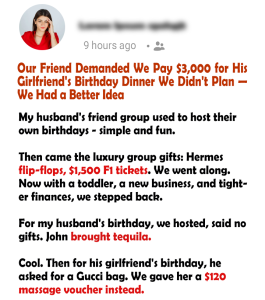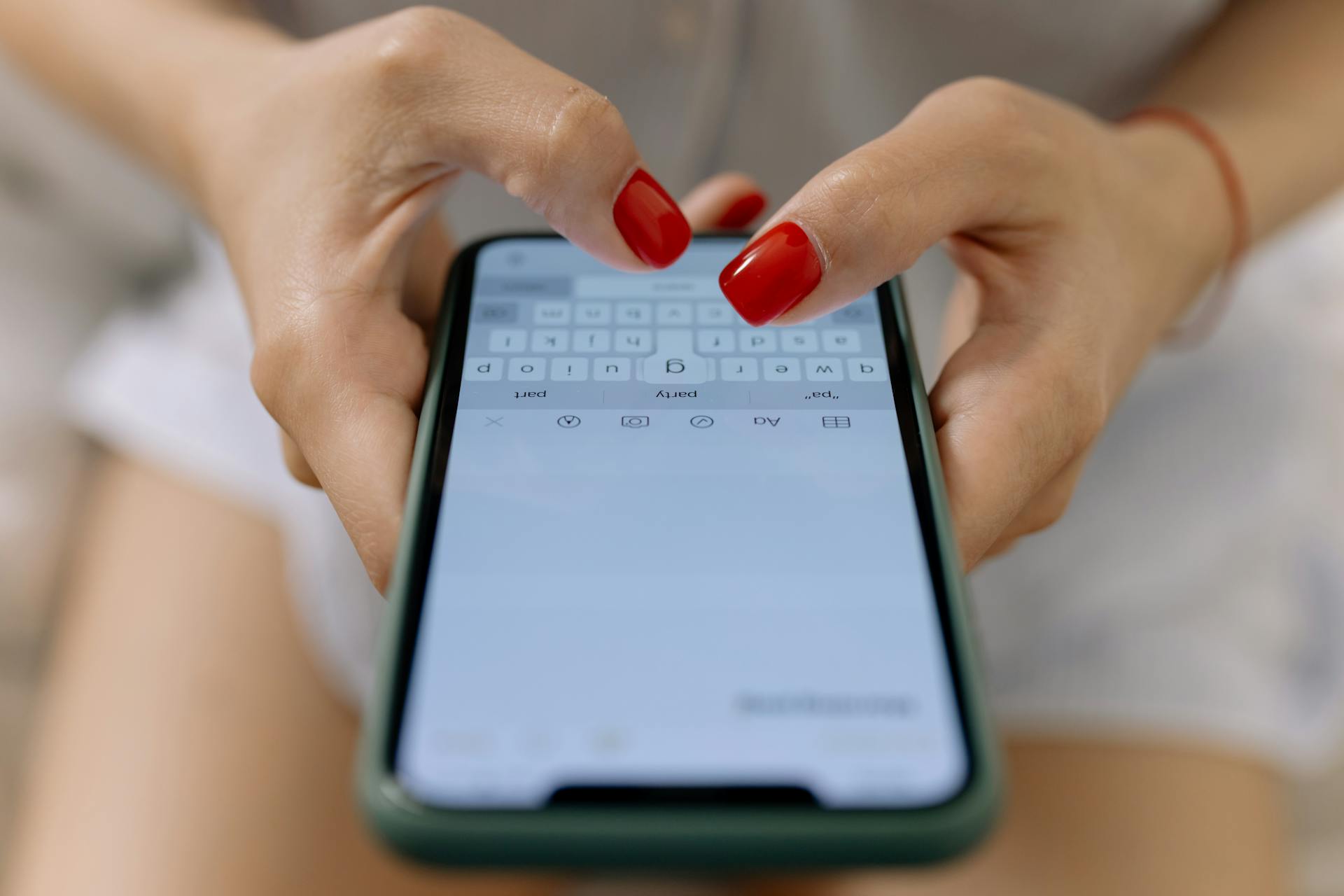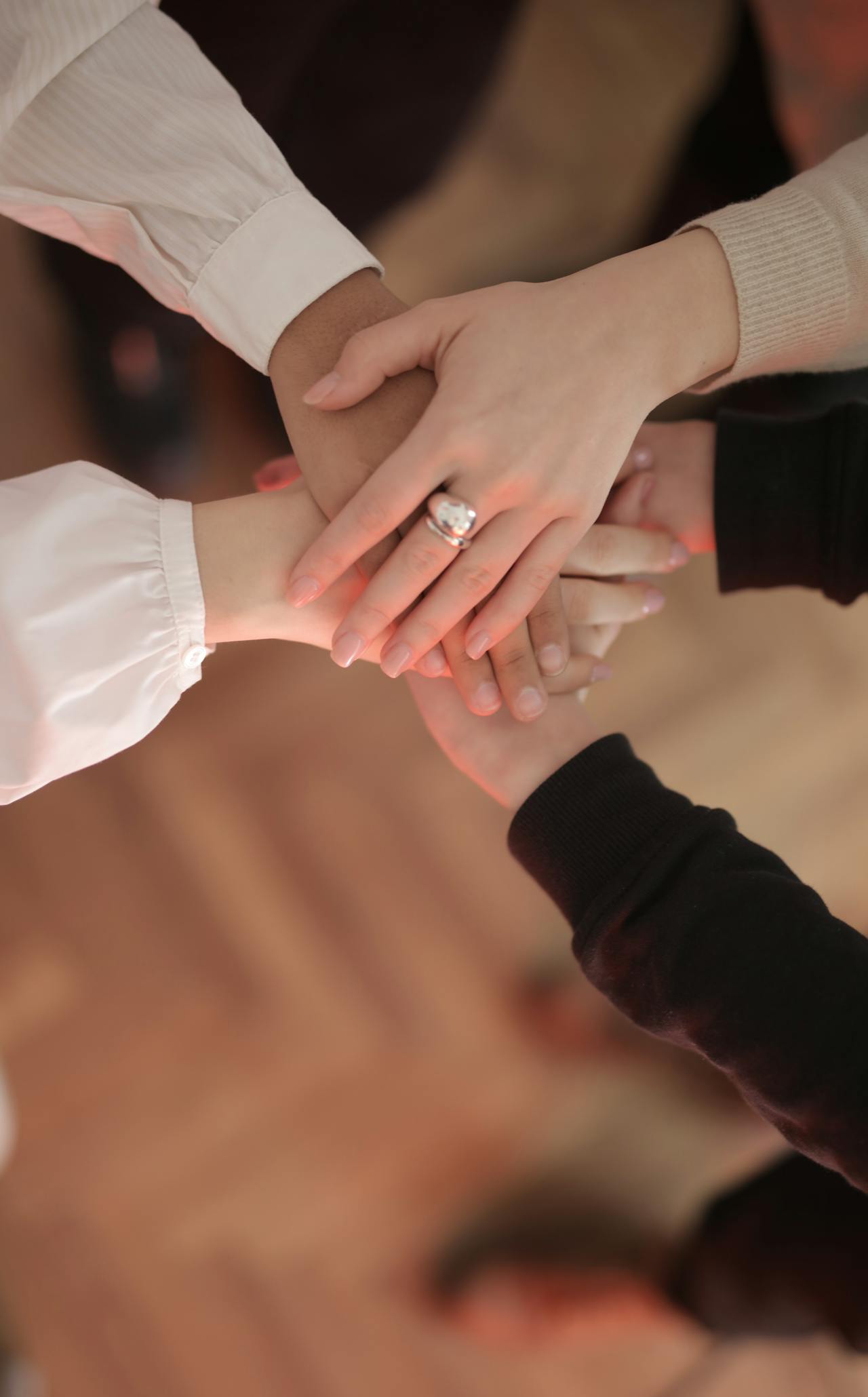
Our friend expected us to cover a $3,000 birthday dinner we didn’t plan just because we didn’t chip in for his girlfriend’s expensive Gucci bag. My husband and I had a better idea. Let’s just say entitlement met its expiration date.
You know that moment when someone’s true colors shine through so bright it nearly blinds you? I’m Daisy, and I discovered my husband’s best friend has been wearing a mask this whole time. What started as innocent birthday celebrations turned into financial extortion, and honey, I wasn’t having it.

People gathered at a birthday party | Source: Unsplash
When Jeremy first introduced me to his circle of friends six years ago, I fell in love with their closeness. I’m talking about five couples, all navigating life in their late 20s and early 30s, celebrating every milestone together.
Back then, birthdays were simple affairs. The birthday person hosted, paid for everyone, and we’d laugh until our sides hurt over homemade pasta and cheap wine.
“This is what real friendship looks like,” I whispered to Jeremy after our first group dinner, watching everyone argue over who got the last piece of garlic bread.
“Just wait until you see Rio’s birthday next month,” Jeremy chuckled, his arm pulling me closer. “He always goes overboard with the decorations.”

A couple embracing each other | Source: Unsplash
Those early days felt magical… like something out of a storybook about adult friendships.
But last year, everything changed. Suddenly, every birthday announcement came with a new group chat notification: “Let’s all chip in for something special!”
And these weren’t your typical gift suggestions, guys. We’re talking designer flip-flops, Formula 1 tickets, and luxury handbags that cost more than some people’s monthly rent.
“Jeremy, look at this,” I said, showing him my phone screen during breakfast one morning. “They want us to contribute $300 for John’s racing experience.”
Jeremy’s coffee cup froze halfway to his lips. “Three hundred? Each?”
“Yes.”

A shocked man holding a coffee cup | Source: Freepik
The pressure felt suffocating. Nobody wanted to be the couple who said no. You know, the ones who broke the spell of generosity that had somehow become mandatory.
So we chipped in. For John’s Formula 1 experience, we contributed our $300, convincing ourselves it was what good friends did.
“It’s just this once,” I told myself, watching our savings account balance drop. “We can manage.”
But that “once” multiplied. John’s girlfriend Christina needed Jimmy Choo pumps for her promotion. Someone else wanted that overpriced designer bag.
Each time, the group chat would buzz with enthusiastic contributions, and each time, we’d quietly transfer money we should’ve been saving for our future.

A woman holding dollar bills | Source: Pexels
Then life blessed us with a miracle. Our beautiful daughter, Madison, arrived, turning our world upside down in the most wonderful way.
Jeremy and I decided to start our own consulting business, pouring our savings into something we’d dreamed about for years. We were still financially stable, but every dollar now had a purpose and a destination that wasn’t luxury gifts for friends.
“Jeremy,” I said one evening, bouncing Madison on my hip while reviewing our budget, “we need to talk about these group gifts.”

A pile of presents | Source: Pexels
He looked up from his laptop, understanding immediately. “I know. With Maddy, the business…”
“We just can’t keep doing this.”
“You’re right, hon. We need to start saving for our future.”
So when Jeremy’s birthday rolled around, we made a decision that felt both liberating and terrifying. We sent a message to the group: “No gifts this year, guys. Just come celebrate with us.”
I spent days preparing for his pool party, transforming our backyard into a paradise of string lights and homemade treats. Every detail mattered because this was our contribution.

A group of people chilling at a pool party | Source: Unsplash
“This is perfect,” Jeremy said, surveying the setup. “This is what I actually wanted.”
John arrived with a bottle of tequila, probably worth about $100, and I felt genuine gratitude. I thought he’d listened and respected our wishes.
“Thank you,” I told him, meaning it. “This is lovely.”
***
Two weeks later, my phone buzzed with a new group chat: “Christina’s Birthday Fund!” John had created another collection, this time for a Gucci bag that cost more than our monthly groceries.
I stared at the message, my heart racing. We’d just established our boundary. We’d just shown them a different way to celebrate. And here we were, right back where we started.

A woman holding her phone | Source: Pexels
“We’re not doing this,” I told Jeremy, my voice shaking with frustration.
“What do we do instead?”
We decided to honor Christina our own way. I spent an hour researching the perfect gift: a luxury spa voucher worth $120. It was thoughtful, personal, and within our means.
***
The birthday dinner was at some beachside restaurant I’d never heard of, with prices that made my eyes water. It was the kind of place where appetizers cost what we used to spend on entire meals.
“This is beautiful,” I told Christina, handing her our gift. “I thought you might enjoy some relaxation after your busy month.”
She smiled, but something felt off. The whole evening felt performative, like we were all actors in a play about friendship rather than actual friends.

People enjoying a party | Source: Unsplash
Then John’s message appeared in the group chat the next morning: a photo of the dinner bill. $3,000.
Caption: “Anyone who wants to chip in for last night’s dinner can!” he wrote, as if he were offering us the privilege of paying for a meal we hadn’t chosen… at a restaurant we hadn’t picked.
My hands shook as I showed Jeremy the message.
“He’s got to be kidding,” Jeremy muttered.
But John wasn’t kidding. His private message to us made that crystal clear:
“Your gift wasn’t enough. Since you didn’t join the Gucci fund, you should help with dinner. Remember what you paid for my F1 ticket? Don’t be rude & greedy. Pay the $3,000. You guys can afford it!”

Grand dinner at a luxury restaurant | Source: Pexels
I read those words three times, each reading making my blood pressure spike higher. The audacity was breathtaking. The entitlement was suffocating.
“Rude and greedy? We gave a thoughtful gift. We didn’t choose that overpriced restaurant. And now we’re supposed to pay for everyone’s meal?”
“He’s demanding we pay $3,000 for a dinner we didn’t plan, at a place we didn’t choose… for a celebration we already contributed to?” Jeremy hissed.
That night, I couldn’t sleep. I kept hearing John’s voice, like he had some claim over our bank account. The way he twisted past gifts into debts we somehow owed him… yeah, that made my blood simmer.
“We have to address this,” I told Jeremy over morning coffee. “Not just with John, but with everyone. This whole system is broken.”

An annoyed woman | Source: Freepik
So we crafted our message carefully, choosing words that felt honest but not accusatory:
“Hi everyone, we love you all. We wanted to let you know we’re stepping back from group gifts. With our growing family & new business, we’re being more mindful about our spending. We’ll always celebrate you in our own way. Thanks for understanding. ❤️“
The responses came quickly. Most were warm, understanding, and even relieved. But one message made me cry. It was from Amy, who confessed she and her husband had felt pressured to contribute while secretly struggling with IVF treatments.
“You speaking up gave us permission to be honest too,” she wrote. “Thank you. 🥺🙏🏻“
Everyone agreed to return to the old tradition. Birthday hosts treating the group. Simple. Fun. No pressure. Everyone except John and Christina, of course.

A displeased couple | Source: Freepik
John’s response was immediate and volcanic: “That message was passive-aggressive. You could’ve just talked to me directly. 😡😤“
Christina’s direct message was even worse: “You should’ve just admitted you were broke instead of making a public statement. 🙄“
I stared at that message for a full minute. The disrespect was staggering. The assumption that our financial responsibility meant poverty was insulting.
“No problem,” I typed back, my fingers flying across the keyboard. “My birthday’s next month. I want a family trip to Thailand. You chipping in?”
Silence.

Birthday party decorations | Source: Pexels
To keep the peace, we contributed $200 toward their dinner. It felt like paying protection money to bullies, but we thought it might end the drama.
We were wrong.
John and Christina continued pouting, making snide comments about our “cheapness” at every gathering. The final straw came when they told us that not accepting gifts at Jeremy’s birthday had made them feel “looked down on.”
“We threw you a beautiful party,” I said, my patience finally snapping. “We opened our home, cooked for hours, and created memories. And somehow we’re the bad guys?”
Jeremy placed a gentle hand on my shoulder. “We’re done.”
We didn’t argue or beg. We simply stopped engaging with their drama.

A cheerful couple | Source: Unsplash
But the rest of the group had reached their limit too. Quietly, without fanfare, John and Christina found themselves removed from the group chat. No announcement. No explanation. Just gone.
The peace was immediate and profound. Our gatherings became fun again. Laughter replaced tension. Genuine celebration replaced performative generosity.
“I can’t believe we put up with that for so long,” Amy chirped at our next dinner. “The stress of those group gifts was keeping me awake at night.”
“Money changes people,” Jeremy replied. “Or maybe it just reveals who they really were.”

Close up shot of money | Source: Pexels
Last week, I heard through mutual friends that John and Christina are still complaining about us and playing victims in their own narrative. They got their Gucci attitude, and now they can throw their tantrums in private.
Here’s what I learned about friendship and money: real friends don’t weaponize generosity. They don’t turn gifts into obligations or kindness into currency. And they don’t demand you bankrupt yourself to prove your loyalty.
True friendship is showing up. It’s caring without keeping score. It’s respecting boundaries and celebrating differences. And it’s understanding that love isn’t measured in dollars spent but in moments shared.
John and Christina wanted to buy friendship with other people’s money. What they ended up purchasing was a one-way ticket out of our lives. And honestly? That’s the best investment we never made!

A group of friends stacking their hands together | Source: Pexels
Here’s another story: My best friend dropped me as a bridesmaid three days before her “perfect” wedding because of my haircut. I was heartbroken… but she never saw what came next.
This work is inspired by real events and people, but it has been fictionalized for creative purposes. Names, characters, and details have been changed to protect privacy and enhance the narrative. Any resemblance to actual persons, living or dead, or actual events is purely coincidental and not intended by the author.
The author and publisher make no claims to the accuracy of events or the portrayal of characters and are not liable for any misinterpretation. This story is provided “as is,” and any opinions expressed are those of the characters and do not reflect the views of the author or publisher.

